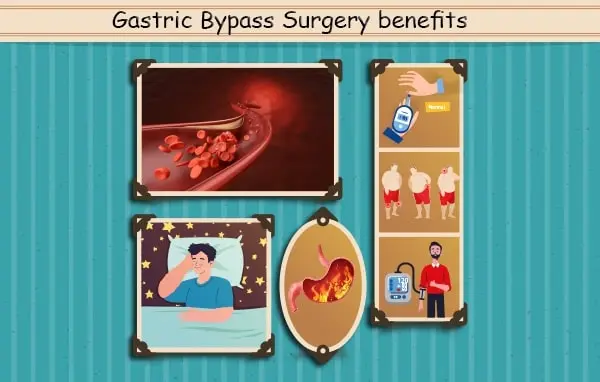6 Major Health Benefits of Gastric Bypass Surgery
6 Major Health Benefits of Gastric Bypass Surgery
Gastric bypass surgery has emerged as a transformative procedure for individuals struggling with obesity and related health issues. Beyond its primary goal of weight loss, this surgical intervention offers a spectrum of significant health benefits, impacting various conditions associated with excess weight. Let’s delve into the six major health advantages of gastric bypass surgery.
1: Hyperlipidemia
Gastric bypass surgery stands out as a potent intervention for managing hyperlipidemia, a condition characterized by elevated levels of lipids in the blood. This surgical procedure offers a multifaceted approach to tackling hyperlipidemia, leading to significant improvements in lipid profiles and overall cardiovascular health. Research has consistently demonstrated the effectiveness of gastric bypass surgery in reducing serum lipid levels, particularly LDL cholesterol and triglycerides. By altering the anatomy of the digestive system and modifying nutrient absorption patterns, gastric bypass promotes substantial weight loss and metabolic changes that positively impact lipid metabolism.
The metabolic alterations induced by gastric bypass surgery extend beyond mere weight reduction. They involve complex hormonal mechanisms that enhance insulin sensitivity and lipid utilization, leading to a favorable shift in lipid parameters over time. Patients undergoing gastric bypass often experience not only a decrease in LDL cholesterol and triglyceride levels but also an increase in HDL cholesterol, the « good » cholesterol, further mitigating cardiovascular risk. Moreover, the benefits of gastric bypass surgery on lipid metabolism extend beyond weight loss alone. Studies have shown that even in patients with modest weight loss post-surgery, there is a significant improvement in lipid profiles, highlighting the metabolic impact of the procedure independent of weight reduction.
Furthermore, the long-term sustainability of lipid improvements post-gastric bypass underscores its efficacy as a therapeutic option for hyperlipidemia management. Unlike conventional pharmacological interventions, which may require lifelong adherence and often come with side effects, gastric bypass offers a more holistic approach by addressing the underlying metabolic dysregulation associated with obesity. In addition to lipid-lowering effects, gastric bypass surgery has been associated with other cardiovascular benefits, including reduced blood pressure, improved endothelial function, and decreased systemic inflammation, further contributing to overall cardiovascular risk reduction.
2: Overtime Remission of Type-2 Diabetes
Type-2 diabetes is a metabolic disorder often associated with obesity, characterized by insulin resistance and high blood sugar levels. Gastric bypass surgery has emerged as a game-changer in the management of this condition, offering the possibility of long-term remission. Research has shown that gastric bypass surgery not only induces rapid weight loss but also triggers significant metabolic changes that can lead to the remission of type-2 diabetes. The surgery alters the anatomy of the digestive system, bypassing a portion of the stomach and small intestine. This not only restricts food intake but also affects the production of gut hormones involved in glucose metabolism.
Several studies have demonstrated the effectiveness of gastric bypass surgery in achieving diabetes remission. Patients often experience a rapid improvement in blood sugar levels immediately following surgery, sometimes even before significant weight loss occurs. This early metabolic improvement is believed to be attributed to changes in gut hormone secretion, leading to enhanced insulin sensitivity and glucose control. Over time, as patients continue to lose weight and maintain lifestyle modifications, the benefits of gastric bypass surgery on diabetes become more pronounced. Many individuals achieve complete remission of diabetes, meaning they no longer require medication or insulin injections to manage their blood sugar levels.
The long-term remission rates of type-2 diabetes following gastric bypass surgery are impressive, with some studies reporting remission rates ranging from 60% to 80% even years after the procedure. This highlights the sustained metabolic benefits of surgery and underscores its potential as a powerful intervention for diabetes management. In addition to achieving remission, gastric bypass surgery has been shown to reduce the risk of diabetes-related complications, such as cardiovascular disease, kidney disease, and neuropathy. By addressing the underlying metabolic abnormalities associated with obesity and diabetes, the surgery offers comprehensive health benefits that extend beyond weight loss alone.
3: Relief from Hypertension and Depression
Hypertension (high blood pressure) and depression are prevalent comorbidities of obesity, significantly impacting the quality of life. Gastric bypass surgery not only aids in substantial weight loss but also contributes to the alleviation of hypertension and depression symptoms. The metabolic changes triggered by the surgery, along with improved self-esteem and psychological well-being post-weight loss, play a pivotal role in managing these conditions.
Hypertension:
Obesity is a known risk factor for hypertension, and its reduction through gastric bypass surgery can lead to significant improvements in blood pressure control. Studies have shown that many patients experience a reduction in both systolic and diastolic blood pressure following surgery. This reduction can often lead to a decreased need for antihypertensive medications and a lower risk of cardiovascular events associated with hypertension.
Depression:
Obesity and depression often coexist, creating a challenging cycle where one condition exacerbates the other. Gastric bypass surgery addresses this by not only promoting weight loss but also triggering positive changes in brain chemistry. The hormonal shifts post-surgery, including increased serotonin levels, can alleviate depressive symptoms. Additionally, the enhanced self-esteem and improved body image that come with significant weight loss can contribute to a better mental outlook.

4 : Elimination of Obstructive Sleep Apnea
Obstructive sleep apnea (OSA) is a common yet serious sleep disorder characterized by repetitive pauses in breathing during sleep, often due to obstruction of the upper airway. This condition is closely associated with obesity, as excess weight can lead to the narrowing of air passages, exacerbating breathing difficulties during sleep. However, gastric bypass surgery has emerged as a highly effective intervention for the elimination or significant improvement of obstructive sleep apnea. Research indicates that gastric bypass surgery not only promotes substantial weight loss but also leads to anatomical changes in the upper airway, reducing the likelihood of airway obstruction during sleep. By altering the gastrointestinal anatomy and facilitating weight loss, gastric bypass surgery helps alleviate pressure on the airways, allowing for smoother and uninterrupted breathing throughout the night.
Many individuals who undergo gastric bypass surgery experience a notable reduction in the severity of obstructive sleep apnea symptoms or achieve complete remission. This improvement in sleep quality can have profound effects on overall health and well-being, reducing daytime sleepiness, improving cognitive function, and lowering the risk of associated complications such as cardiovascular disease and hypertension.Moreover, addressing obstructive sleep apnea through gastric bypass surgery can have far-reaching benefits beyond sleep quality. Patients often report enhanced energy levels, increased daytime alertness, and improved mood following successful treatment of sleep apnea. By restoring restorative sleep patterns and promoting better oxygenation during sleep, gastric bypass surgery contributes to a comprehensive improvement in quality of life for individuals affected by obstructive sleep apnea.
5: Relief from Acid Reflux
Acid reflux, also known as gastroesophageal reflux disease (GERD), is a common gastrointestinal disorder characterized by the regurgitation of stomach acid into the esophagus, causing discomfort and potential complications. Obesity is a significant risk factor for acid reflux due to increased abdominal pressure and changes in the structure of the stomach. Gastric bypass surgery has emerged as a highly effective treatment for acid reflux, offering long-term relief and improving overall digestive health. The surgical procedure involves creating a small pouch at the top of the stomach and connecting it directly to the small intestine, bypassing a portion of the stomach and the lower esophageal sphincter (LES), the muscle that normally prevents stomach acid from flowing back into the esophagus.
By bypassing the lower part of the stomach and the LES, gastric bypass surgery reduces the likelihood of acid reflux episodes. Additionally, the surgery alters the secretion of digestive juices, including stomach acid, leading to a decrease in reflux symptoms. Many patients experience a significant reduction or complete resolution of acid reflux symptoms following gastric bypass surgery.
6: Relief from Joint Pains
Excess weight is a significant contributor to joint pain and inflammation, particularly in weight-bearing joints such as the knees, hips, and spine. Individuals suffering from obesity often experience chronic joint discomfort, which can severely impact their mobility and overall quality of life. However, gastric bypass surgery offers a ray of hope by providing substantial relief from joint pains. Following gastric bypass surgery, patients typically experience rapid and significant weight loss, which alleviates the pressure exerted on the joints. This reduction in body weight reduces the strain on the musculoskeletal system, leading to decreased inflammation and pain in the affected joints.
Moreover, the metabolic changes induced by gastric bypass surgery contribute to further improvements in joint health. The surgery alters hormonal balance, leading to favorable changes in inflammatory markers and cytokine levels, which play a crucial role in joint inflammation and pain perception. Patients often report a remarkable improvement in joint function and mobility after undergoing gastric bypass surgery. Activities that were once challenging or painful become more manageable, allowing individuals to engage in a more active and fulfilling lifestyle. In addition to relieving existing joint pain, gastric bypass surgery also helps prevent future joint damage and degeneration. By maintaining a healthy weight and lifestyle post-surgery, patients can reduce the risk of developing conditions such as osteoarthritis, which are commonly associated with obesity-related joint issues.
Gastric bypass surgery not only serves as an effective treatment for obesity but also yields profound health benefits across various medical conditions. From improving lipid profiles to alleviating diabetes symptoms and enhancing overall well-being, the impact of this surgical intervention extends far beyond weight loss, offering a new lease on life for many individuals battling obesity-related health issues.

